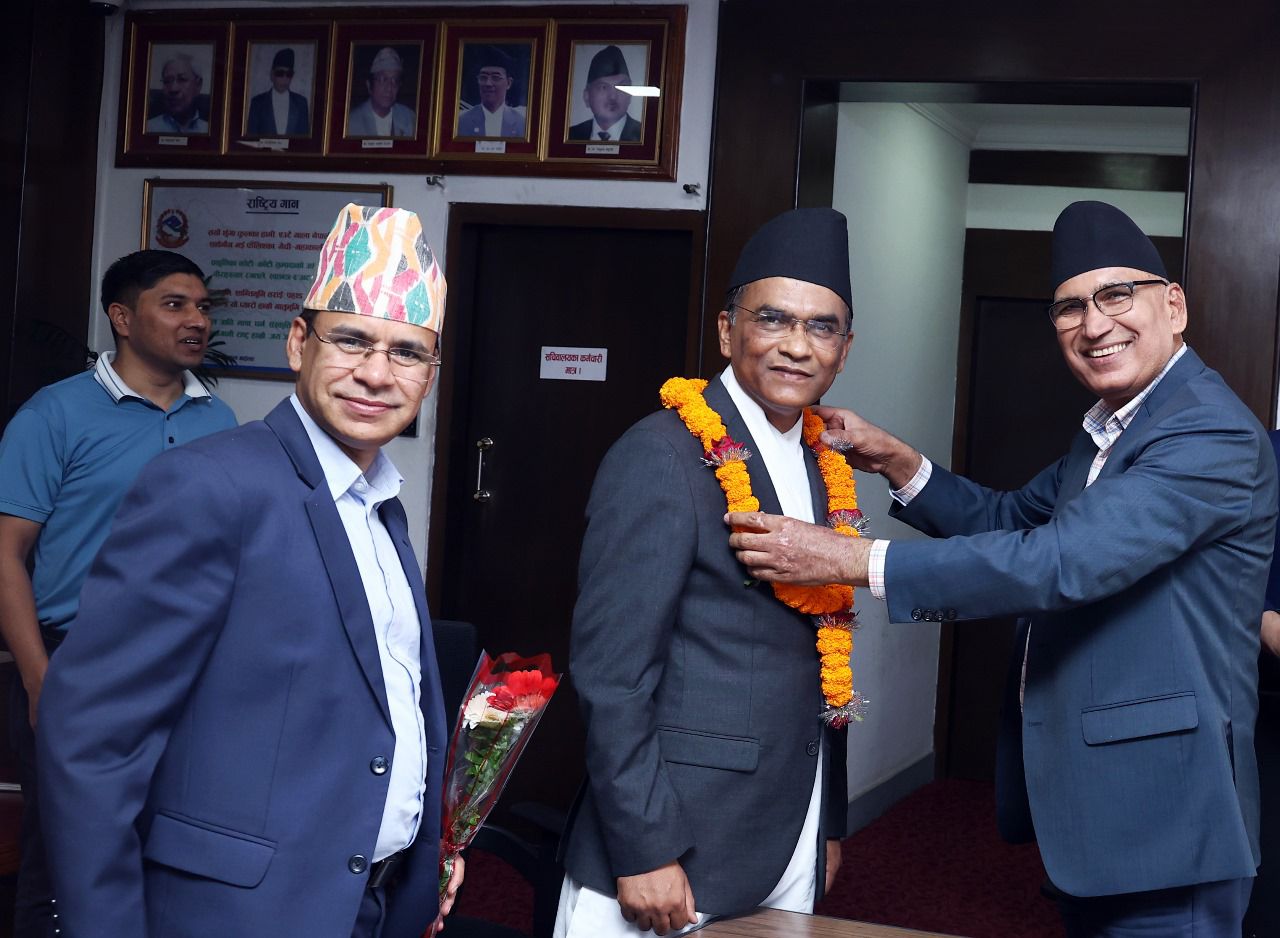Poudel sworn in as new Nepal Rastra Bank Governor
Newly appointed Governor of Nepal Rastra Bank Biswo Poudel took the oath of office and secrecy on Wednesday.
He took the oath of office and secrecy before Chief Justice Prakash Man Singh Raut amidst a ceremony held at the Supreme Court.
The government on Tuesday appointed Poudel as the 18th Governor of Nepal Rastra Bank (NRB). The decision was made during a Cabinet meeting held on Tuesday evening at the Prime Minister’s official residence in Baluwatar.
Three names were recommended for the position by a committee led by Deputy Prime Minister and Finance Minister Bishnu Paudel. The committee shortlisted Poudel, Acting Governor Neelam Dhungana and former Secretary Dinesh Bhattarai for the role earlier on Tuesday. The governor’s post had remained vacant since April 7, after the end of the previous term.
Before the Cabinet decision, Prime Minister KP Sharma Oli and Nepali Congress President Sher Bahadur Deuba held discussions regarding the appointment. Initially, Gunakar Bhatta, Executive Director at NRB, was considered for the role, reportedly with backing from Deuba. However, consensus could not be reached, and Deuba subsequently proposed Poudel as a compromise candidate.
As Governor, Paudel will serve as the chief economic advisor to the government and play a key role in formulating monetary policy in line with fiscal policy.
He previously served as the Vice-chair of National Planning Commission (NPC), Senior Economic Advisor at the Ministry of Finance, Chairperson of the board of governors of ICIMOD, president of the Colombo Plan council and chair of Regional Economic Cooperation and Integration (RECI) in Asia and the Pacific. Additionally, he also served as the Chief Economic Advisor of Confederation of Nepalese Industries (CNI), and a member of the Board of Directors of Sanima Bank and Sanima Middle Tamor Hydropower Company.
He also ran as a Nepali Congress candidate from Chitwan-1 in the 2022 parliamentary elections but lost to Rastriya Swatantra Party (RSP)’s Hari Dhakal.
Earlier, advocates Pratibha Upreti and Bishal Thapa had filed the writ at the Supreme Court, demanding that Poudel be disqualified from the position. However, the Supreme Court administration dismissed the writ. The advocates had submitted an application to reverse the writ rejection decision, but the court did not entertain the request.
US to skip G20 summit in South Africa
US Secretary of State Marco Rubio announced Tuesday that President Donald Trump will not attend the upcoming G20 summit in South Africa. Speaking before the Senate Foreign Relations Committee, Rubio said the decision was made due to the summit’s agenda, which the administration believes does not align with US priorities.
The announcement comes amid growing tensions between the two countries. Relations have worsened since South African President Cyril Ramaphosa signed the Expropriation Act into law in January. In March, the US expelled South Africa’s ambassador, Ebrahim Rasool, Xinhua reported.
Despite the strained ties, Ramaphosa is currently visiting the US and is expected to meet with Trump to discuss trade and bilateral cooperation.
US cuts another $60m in grants to Harvard University
The US Department of Health and Human Services (HHS) has terminated $60m in federal grants to Harvard University, citing the school’s failure to address antisemitic harassment and racial discrimination.
In a statement on X, HHS said federal funding must go to institutions that “protect all students” and will not tolerate discrimination, Al Jazeera reported.
The move is part of a broader conflict between President Donald Trump’s administration and elite universities, following pro-Palestinian protests on campuses. Trump has called the demonstrations antisemitic, while student organizers say they are peaceful protests against Israel’s actions in Gaza.
Harvard rejected federal demands for disciplinary changes, removal of diversity programs, and external oversight, arguing they would compromise academic independence, according to Al Jazeera.
In response to the funding cut, Harvard has allocated $250m from its own funds to support affected research and has filed a lawsuit, claiming the cuts violate the First Amendment and federal law.
Foreign Minister Rana leaves for Japan
Foreign Minister Arzu Rana Deuba has left for Japan to participate in the international conference on social isolation in senior citizens, which is starting tomorrow in Tokyo. She left for Japan last night.
The conference theme is -“Addressing Social Isolation and Loneliness Among Older People.”
Minister Rana is scheduled to address the conference on behalf of Nepal.
The conference organised by the Foundation for the Welfare and Education of the Asian People will have the participation of ministers, senior government officials, and social activists from more than 12 countries.
Minister Rana, who has been working for a long time in the field of economic uplift and social protection of Nepali women through Rural Women and Development Centre and organizations like the Safe Motherhood Network, has been invited as the special guest of the programme.
While in Japan, the Foreign Minister is scheduled to hold important bilateral meetings. She is set to return home next Saturday.




















